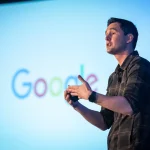AI carries twin and seemingly contradictory threats: of destroying the social fabric through omnipresent and persuasive deception and of concentrating power in a “singularity” of model creators or models themselves. These two threats are narrowing the corridor in which plural (free and democratic) societies can thrive. To avoid this Scylla and Charybdis, we must harness these tools to proactively widen that corridor, a strategy that has been labeled “Plurality” by its leading practitioner, Taiwan’s Digital Minister Audrey Tang who has made that country the light to the free world.
Drawing on his forthcoming book jointly with her, Glen will show you how to harness Plurality to improve health, fuel productivity and create a richer media environment, all by harnessing and while contributing to human diversity and cooperation through digital technology
The next wave of generative foundation models (GFMs) succeeding ChatGPT and DALL-E, will make indistinguishable and arbitrarily manipulable simulation of human content (e.g. video, voice, documents) ubiquitous, liquidating much of the foundation of social cooperation and trust.
Maintaining trust and collaboration will require a revolution in verification and dramatically expanded applications of cryptography. Luckily Web3 ecosystems like Ethereum and countries like Taiwan have been coping with similar threats for years now. In this talk, Glen will draw lessons from these experiences to help individuals and organizations of all sizes survive and thrive in this disruption
Glen Weyl is the co-inventor of Quadratic Funding, the hottest new approach to supporting social entrepreneurship and cross silo-collaboration within companies, is Microsoft’s Office of the Chief Technology Officer Political Economist and Social Technologist and Founder of the RadicalxChange Foundation.
Glen will explain how QF works, how it has been mathematically proven as the optimal way to support public goods and how it is transforming open-source software, the blockchain, media and social service provision. Whether you’re looking to tap the wisdom of your employees to catalyze new cross-company entrepreneurship or catalyze effective charitable giving, QF is one of the most powerful tools available today and there’s no one better to learn about it from than its pioneer.
Glen Weyl, a former professor of economics at the University of Chicago, developed the economic theory behind many recent advances in antitrust policy, from the 2010 US merger guidelines to the use of antitrust to protect workers. As Microsoft’s Office of the Chief Technology Officer Political Economist and Social Technologist, he is today at the forefront of technology competition and regulatory policy.
His talk will cover some of the most innovative approaches to addressing the problems of technology monopoly platforms, including treating data as labor, forming collective bargaining institutions such as data coalitions, the democratization or utilization of platforms and the use of new open protocols to facilitating meaningful portability. Today every company is a digital company and we all depend on the infrastructure controlled by a few dominant technology platforms. Here is a clear glimpse into the future that will determine the fate of your business and how you can shape it.
Glen Weyl stands at the crossroads of technology, economics, and democratic renewal. As a researcher, strategist, and movement builder, he leads global efforts to ensure emerging technologies—Web3, the metaverse, AI, and social networks—strengthen rather than erode democracy and pluralism.
Currently heading the Plural Technology Collaboratory (PTC), the world’s foremost industrial research group exploring how diverse societies can thrive amid generative AI and decentralization, Glen combines visionary theory with hands-on impact. He previously served on the leadership team of Microsoft’s Office of the CTO, where he led the company’s relationship with OpenAI and advised senior leaders on geopolitics and macroeconomics.
Glen’s influence extends far beyond corporate research. As the main intellectual collaborator of Vitalik Buterin (Ethereum), Jaron Lanier (virtual reality), and Audrey Tang (Taiwan’s Digital Minister), he’s uniquely positioned at the intersection of technical design and democratic governance. His landmark book, Radical Markets, introduced groundbreaking social technologies—such as Quadratic Voting and Quadratic Funding—now used globally as models for civic innovation.
Web 3, the metaverse, artificial intelligence and social networks are transforming our society and economy, and core social values like democracy and pluralism. Glen Weyl is the world’s leading expert on how to harness these emerging tools to advance support, advance and renew those values.
As the main intellectual collaborator of Vitalik Buterin (Founder of Ethereum), Jaron Lanier (father of virtual reality) and Audrey Tang (Digital Minister of Taiwan), Glen makes the dizzying possibilities of the future digestible.
Glen Weyl was on the leadership team of Microsoft’s Office of the CTO, which led the relationship with OpenAI, and is now leading the main industrial research group (the PTC) addressing how plural (free, democratic and diverse) societies can thrive in the age of generative foundation models.
View further Artificial Intelligence speakers and follow us on LinkedIn
In this 29-minute World Economic Forum session, economist and technologist Glen Weyl examines how emerging technologies—from AI to Web3—can be reimagined to reinforce democracy, pluralism, and shared prosperity.
In this thought-provoking presentation at the World Economic Forum, Glen Weyl, Founder of RadicalxChange and Research Lead of the Plural Technology Collaboratory, challenges global leaders to rethink how technology intersects with governance and economics. He opens by acknowledging the paradox of the digital age: while AI, social networks, and decentralized platforms promise empowerment, they have also deepened polarization and inequality.
Glen argues that the solution lies in embracing Plurality—a design philosophy and governance model that prioritizes collaboration across difference. Drawing from his experience co-developing Quadratic Voting and his partnerships with Vitalik Buterin (Ethereum), Audrey Tang (Taiwan), and Jaron Lanier (virtual reality pioneer), he demonstrates how plural systems can align innovation with democratic accountability.
He explores how Web3’s decentralized tools, when grounded in shared social values, can counter the concentration of power in large tech platforms. Through case studies, Glen highlights how plural governance models are already influencing AI ethics, civic participation, and data ownership frameworks worldwide.
Midway through the session, he discusses his work at Microsoft’s Office of the CTO and the Plural Technology Collaboratory (PTC)—a global research group developing mechanisms to ensure AI and digital infrastructure serve free, diverse, and democratic societies. He frames this as a moral imperative: as AI and generative models reshape economies and institutions, pluralism must be built into their foundations.
The talk concludes with a call to action: to design economic and digital systems that reflect human interdependence rather than dominance, enabling innovation that is both equitable and enduring.
Timestamped Synopsis:
In this in-depth, 2-hour and 21-minute discussion, Glen Weyl unpacks the philosophy and practice of Plurality—his visionary framework for reimagining technology, economics, and democracy in the age of AI and decentralization.
In Harnessing the Power of Plurality, Glen Weyl delivers a sweeping exploration of how society can thrive amidst the profound transformations driven by artificial intelligence, Web3, and networked digital systems. Over more than two hours, he guides audiences through his life’s work—combining deep theory with actionable models for building plural, participatory, and resilient institutions.
The session begins with Glen defining Plurality as the principle of collaborative diversity—a counterweight to both authoritarian control and atomized individualism. Drawing on decades of research and collaboration with leaders like Vitalik Buterin (Ethereum), Jaron Lanier (virtual reality), and Audrey Tang (Taiwan’s digital democracy architect), he demonstrates how plural technologies can enable shared progress without sacrificing freedom or inclusivity.
Through structured dialogue, visual frameworks, and live Q&A, Glen examines:
The failures of centralized and monopolistic models in tech and governance.
The promise of decentralized collaboration to align innovation with democratic values.
How new mechanisms—like Quadratic Voting, data cooperatives, and plural networks—can balance competition and cooperation.
He integrates insights from his leadership at the Plural Technology Collaboratory (PTC) and RadicalxChange, describing real-world experiments that operationalize plural principles in AI governance, digital identity, and civic engagement.
Midway through, the conversation expands into ethics, geopolitics, and institutional design, exploring how pluralism can stabilize democratic societies under technological and cultural strain. Glen argues that the survival of democracy in the 21st century depends on designing systems that recognize interdependence—not uniformity—as the basis for human and machine cooperation.
The session concludes with a forward-looking dialogue on how plural values can be embedded into the governance of AI, data, and decentralized networks—ensuring technology serves collective empowerment rather than concentrated power.
**Overview:**
Glen has received positive feedback for his insightful contributions to discussions on data integrity and digital rights. Reviewers highlight his ability to challenge conventional thinking, particularly his perspective on data production as a form of work, which has sparked significant interest and will likely influence future dialogues in the field.
**Strengths:**
– Engaging speaker who opens minds to complex concepts
– Thought-provoking ideas that encourage deeper discussions
– Recognized for his contributions at reputable conferences
**Weaknesses:**
– No notable weaknesses were mentioned in the reviews.
Overall, Glen is praised for his visionary approach and impactful presence in discussions surrounding digital rights and data ownership.
Speaker fees can vary depending on factors such as expertise, demand, and event specifics. While some speakers may charge a flat fee for their services, others may have hourly rates. It’s best to discuss fee structures directly with the speaker or their representative to understand the pricing model.
Keynote speeches typically range from 30 to 90 minutes, with the duration determined by the speaker’s expertise, the event’s agenda, and audience preferences. Keynote speeches often include a combination of inspirational stories, practical insights, and actionable advice tailored to the event’s theme or objectives.
The scale of the event and audience size can indeed impact a speaker’s fee. Larger events with a broader reach or higher attendance may command higher fees due to increased exposure and demand. Conversely, smaller events or niche audiences may offer opportunities for more flexible pricing arrangements.
Travel expenses such as transportation, accommodation, and meals are typically negotiated separately from the speaker’s fee. These costs vary depending on the speaker’s location, travel distance, and event duration. It’s important to clarify travel arrangements and expenses during the booking process to avoid misunderstandings.
Many speakers require a deposit to secure a booking, with the remaining balance due closer to the event date. Deposits are often non-refundable and serve as a commitment from both parties. It’s advisable to discuss deposit requirements and payment terms with the speaker or their representative when finalizing the booking.
Ready to find the perfect speaker for your event? Use our advanced search feature or contact us to get started today!

Steve Lerch is an award-winning international public speaker, consultant, and former Google Executive, and has become a highly respected voice in the world of digital strategy, marketing, consumer behavior, and innovation. While at Google, Steve served as a digital strategy advisor to prominent brands like GoPro and Roku, respected non-profits like the YMCA and Save the […]

Winston Ma, CFA & Esq., is an esteemed figure in the global digital economy, whose multi-faceted career has made him a sought-after speaker, advisor, and thought leader in Chinese economics and global tech investment. His journey spans roles as an investor, attorney, author, and educator, giving him a broad, yet incisive, understanding of the dynamic […]

Graham Fink is a world-renowned creative mind known for his groundbreaking work in advertising, art, and technology. As one of the most awarded creatives globally, Fink has transformed disciplines such as photography, film, painting, and drawing, merging these fields with advanced technology. His multidisciplinary approach and relentless pursuit of new creative frontiers have redefined creativity […]

Salim Ismail is a visionary strategist and a renowned technology entrepreneur who has profoundly impacted the global business landscape. As the founding executive director of Singularity University and the author of the best-selling book Exponential Organizations, Salim has become a leading authority on disruptive innovation and exponential technologies. As the founding executive director of Singularity […]

Best known as a creator of Siri, Apple’s AI assistant, Adam Cheyer is a visionary pioneer in artificial intelligence and computer-human interaction. With a career spanning decades at the forefront of technological innovation, he has helped shape the evolution of AI, voice interfaces, and the future of human-computer collaboration. As an inventor with 39 patents, […]

Called “Silicon Valley’s most provocative voice” for his ideas on technology trends, globalization, US competitiveness, and the future, Vivek Wadhwa’s work puts him at the heart of innovation. From tech entrepreneur and business owner to accomplished academic and widely published author, he served as a Stanford University research fellow and the Director of Research at […]

Daniel Burrus is heralded as one of the globe’s preeminent futurist speakers on global trends and disruptive innovation. With an extraordinary ability to translate complex technological trends into actionable business insights, Burrus has become a pivotal figure in strategic consulting. His keen insights and articulate delivery have earned him accolades from prestigious publications like The […]

Michael Tchong unique approach to decoding the future has positioned him as a preeminent trend-spotter and an influential figure in the realms of technology and entrepreneurship. With a distinct passion for staying ahead of emerging waves, Michael has established four successful startups, each leaving an indelible mark on their respective industries. His unwavering advocacy for […]
No results available
These remain the property of its owner and are not affiliated with or endorsed by Speakers Inc.
All talent fees exclude VAT, travel and accommodation where required.
Our Mission:
© All rights reserved 2026. Designed using Voxel